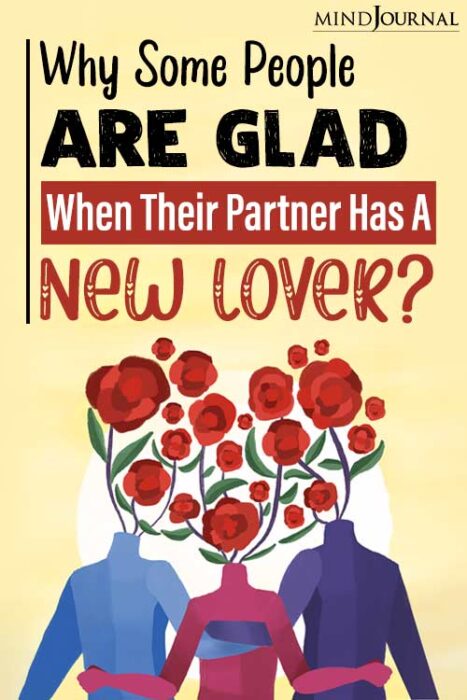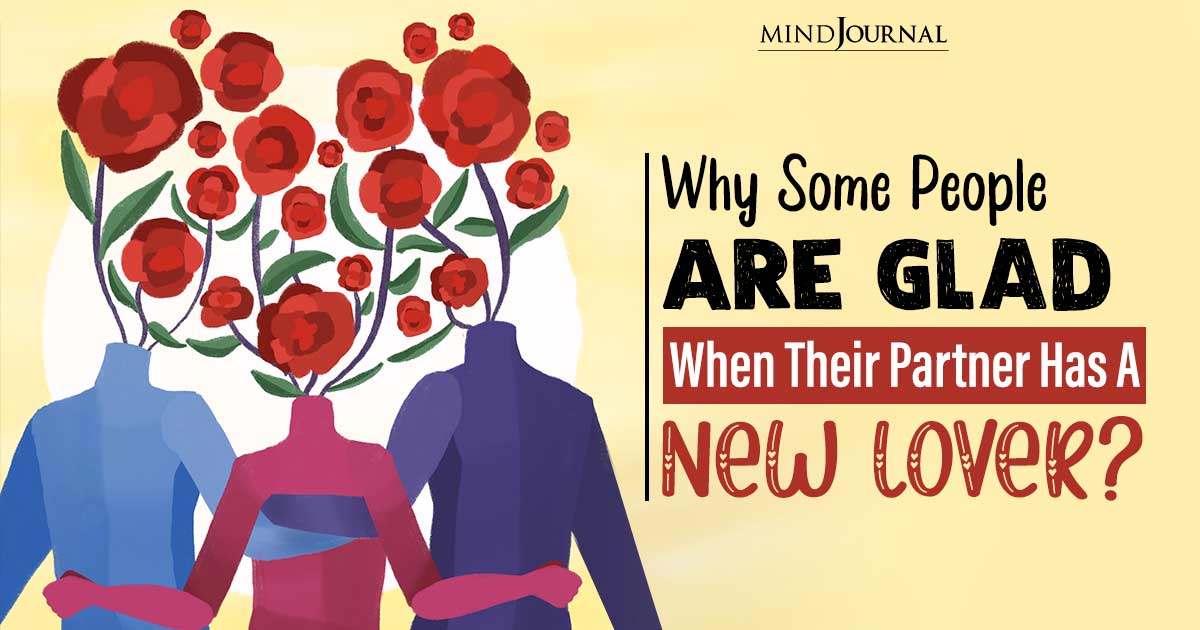What if I told you that some people instead of feeling jealous, feel happy when their partner has a new lover? Yes, in some cases, compersion reigns supreme instead of jealousy. When partner has a new lover, they feel glad to see them happy.
Key Points:
- Feeling jealousy is more natural than compersion in both monogamous and non-monogamous relationships.
- We should not wage war against jealousy—when jealousy is moderate, it can contribute to romantic relations.
- While compersion is not a miracle cure, it is also not a poison. In some circumstances, compersion can be a valuable emotion.
A person may feel two major opposing emotions towards the romantic good fortune of their lover: jealousy, which responds negatively to their happiness with another, and compersion, which positively responds to it. Which one is more useful in romantic relationships?
Related: Revealing the Mask: Top 7 Indicators of Unhealthy Jealousy
The romantic value of jealousy and compersion
“He that is not jealous, is not in love.” —Saint Augustine
“Love is when the other person’s happiness is more important than your own.” —H. Jackson Brown
Jealousy involves a negative evaluation of the possibility of losing something—typically, a favorable human relationship with someone else.
Since the comparative concern is central in jealousy, jealousy is more intense when the domain of a rival’s achievements is also a domain of high self-relevance to one’s self-esteem.
Thus, women who consider external appearance to be of great relevance to their self-esteem are more jealous if their spouses had an affair with a good-looking woman than with a wise woman (DeSteno & Salovey, 1996).
Having your own affair will also decrease jealousy toward your partner’s affairs, as the risk of hurting your self-esteem is lower.
“Compersion,” a recently coined term, describes sympathetic joy in response to your partner’s happiness with another lover. Compersion, which expresses our happiness for our partner’s romantic affair with another, is a type of sexual and romantic generosity—of giving more than is expected.
The value of these emotions in romantic relationships is disputable. Generally, genuine mutual love should enhance the well-being of both the beloved and the lover. But what happens when these needs are incompatible?
A long tradition maintains that love has less to do with the lover’s own needs and more with the beloved’s needs (e.g., Levinas, 1998). Yet a different approach emphasizes that the needs of the lover are not necessarily a secondary concern (Wonderly, 2017).
This is obvious in the dialogical approach to romantic love, which considers the interaction between the two partners to be essential to love (Krebs, 2014).
Profound romantic love encompasses genuine care towards the beloved; however, it is not a general concern for the beloved’s happiness in all circumstances. Frequently, the lover desires the beloved’s happiness in a conditional manner—only insofar as the lover is either a part or the cause of this happiness.
In particular, many people do not want their beloved to be sexually happy with another person (Ben-Ze’ev, 2019).

Is jealousy a more natural emotion?
“Jealousy contains more of self-love than of love.” —Francois de La Rochefoucauld
There are various factors determining whether a certain emotion is more or less natural. Two such major factors concern the linguistic (and cultural) and developmental realms.
The linguistic factor is clear: Many languages do not have a specific term for sympathetic joy, while all languages have terms for jealousy. Sympathetic joy in the romantic realm is also nameless—and the recent need to invent a word for it, namely, “compersion,” testifies to such a void.
Similarly, cultures in various periods and places frequently deal with jealousy, while compersion is less discussed—though in recent years it has received much media attention, one reason being its unique nature.
Children’s behavior and experiences are also relevant in determining the natural aspect of jealousy and compersion. There is ample evidence for the presence of jealousy, even in infancy.
In one study, 6-month-old infants were exposed to their mothers attending, in turn, to a lifelike baby doll and a book. Infant negativity was greater when maternal attention was directed toward the social object, suggesting the presence of an early form of jealousy at that age (Hart & Carrington, 2002).
Sympathy is found in infants, but it typically refers to the object’s suffering, rather than to the object’s success, as is in the case of compersion. One study found that humans have a remarkable ability to share the distress of others, but may react less strongly to the joy of others.
However, intense positive empathy is evident in our attitudes toward winning sports teams and our children (Perry et al., 2012).
Related: Healthy Ways To Express Jealousy In A Relationship: 5 Things You Can Do
Can consensual non-monogamous relationships eliminate jealousy?
“Jealousy, that dragon which slays love under the pretense of keeping it alive.” —Havelock Ellis
“When the lover of my husband sits on his knees, I melt: ‘They’re sooooo cute!’” —Swann, in Hypatia from Space, Compersion
Consensual nonmonogamy comes in different flavors. Open sexual marriages (and other committed relationships) and polyamory are prime examples, and each has many variations on its main theme. Can non-monogamous relationships be completely free of jealousy?
Empirical research indicates that although sexual or romantic relationships with others are not prohibited within consensual nonmonogamous relationships, individuals may still experience jealousy, restrict their partner’s extradyadic behaviors, or otherwise engage in mate guarding, i.e., behaviors that thwart partner defection.
Consensually nonmonogamous individuals often report experiencing jealousy, but process and manage this jealousy by communicating openly with their partner about these experiences and negotiating agreements about what types of extradyadic sexual or romantic behaviors are acceptable (Mogilski et al., 2019).
Jealousy among monogamous individuals is more intense and distressing, while consensually nonmonogamous individuals are more frequently concerned about circumstances associated with jealousy.

The lower intensity and impact of jealousy in consensually nonmonogamous individuals may be due to the possibility that such relationships are better suited for people who are naturally less jealous. It may also be due to the influence of nonmonogamous ideology.
Another relevant point is that while many people in monogamous relationships perceive low-intensity of jealousy as a positive element, such jealousy is perceived as highly negative in polyamorous relationships.
Thus, it is common for individuals in polyamorous relationships to leave a partner if controlling behaviors or consistent patterns of jealousy are exhibited (Ziegler et al., 2014). This may be due to the more common and vivid opportunities for generating jealousy.
The more natural character of jealousy as compared to compersion is evident in the fact that compersion must be developed, sometimes through hard work.
Thus, Masha Halevi, a polyamorous therapist, writes, “For me personally, compersion is not necessarily this effortless joyful feeling… yes, I would like to feel it naturally, but I don’t. I get scared and jealous on occasions” (Halevi, 2021: 256-258).
By contrast, no one needs a tutorial in jealousy. It is a spontaneous reaction that we can merely try to moderate.
Katherine Aumer and colleagues (2014) found that women scored higher on jealousy and lower on compersion than men. For women who are successful in their monogamous relationships, jealousy increases satisfaction; for women whose monogamous relationships have failed, jealousy and lack of compersion are detrimental.
Aumer and colleagues further found that those in monogamous relationships are happier when they perceive their partners as jealous, which may be seen as a sign of faith and desire to maintain exclusive bonds.
Jealousy in monogamous relationships and compersion in non-monogamous ones indicate that the chosen relationship is more likely to last longer. (Aumer et al., 2014).
Related: 7 Ways You Can Deal With Jealousy In Your Relationship
To sum up, emotional experiences are a package deal that includes both positive and negative emotions. We should not wage war against jealousy—when jealousy is moderate, it can contribute to romantic relations.
Similarly, while compersion is not a miracle cure, it is also not a poison. In some (more limited) circumstances, compersion can be a valuable emotion. Making our partner happy is, after all, what underlies profound love (Brunning, 2020; de Sousa, 2018).
References:
Aumer, K., et al. (2014). The happy green eyed monogamist: Role of jealousy and compersion in monogamous and non-traditional relationships. Electronic Journal of Human Sexuality, 17, 77-88 Ben-Ze’ev, A. (2019). The arc of love: How our romantic lives change over time. University of Chicago Press. Ben-Ze’ev, A. (2022). “’I am glad that my partner is happy with her lover’: On jealousy, and compersion,” in A. Pismenny & B. Brogaard (eds.) (2022), The moral psychology of love. Rowman & Littlefield, 127-150. Brunning, L. (2020). Compersion: An alternative to jealousy? Journal of the American Philosophical Association, 6, 1-21. DeSteno, D. A. & Salovey, P. (1996). Jealousy and the characteristics of one's rival. Personality and Social Psychology Bulletin, 22, 920-932. de Sousa, R. (2018). Love, jealousy, and compersion. In C. Grau & A. Smuts (eds.), Oxford handbook of philosophy of love. Oxford University Press. Halevi, M. (2021). The freedom to choose: Rethinking monogamy, marriage and relationships. Pro Publishing. Hart, S., & Carrington, H. (2002). Jealousy in 6-month-old infants. Infancy, 3, 395-402. Krebs, A. (2014). Between I and Thou–On the dialogical nature of love. In C. Maurer, T. Milligan, and K. Pacovská (eds.), Love and its objects. Palgrave Macmillan, 7-24. Levinas, E. (1998). On thinking-of-the-other: Entre nous. Columbia University Press. Mogilski, J. K., Reeve, S. D., Nicolas, S. C., Donaldson, S. H., Mitchell, V. E., & Welling, L. L. (2019). Jealousy, consent, and compersion within monogamous and consensually non-monogamous romantic relationships. Archives of Sexual Behavior, 48, 1811-1828. Perry, D., Hendler, T., & Shamay-Tsoory, S. G. (2012). Can we share the joy of others? Empathic neural responses to distress vs joy. Social Cognitive and Affective Neuroscience, 7, 909-916. Wonderly, M. (2017). Love and attachment. American Philosophical Quarterly, 54, 232-250. Ziegler, A., et al. (2014). Does monogamy harm women? Chapman University Digital Commons.
Written By Aaron Ben-Zeév Originally Appeared On Psychology Today









Leave a Reply
You must be logged in to post a comment.